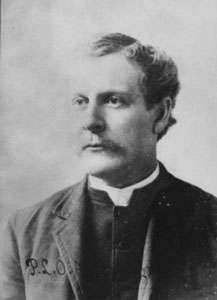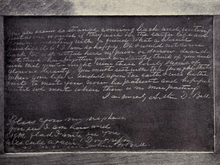Pierre L. O. A. Keeler


Pierre Louis Ormond Augustus Keeler (1855-1942) most well known as Pierre L. O. A. Keeler was an American spiritualist medium.[1]
Career
Keeler was most well known for his materialization, pellet reading and slate-writing mediumship. He was investigated in 1885 by the Seybert Commission who suspected his phenomena was fraudulent.[1][2]
The magician Henry R. Evans sat with Keeler in April, 1895 suspected that he had written the 'spirit' messages on the slates himself. According to Evans "I was sure he was writing under the table; I heard the faint rubbing of a soft bit of pencil upon the surface of a slate... several times I saw him put his fingers into his vest pockets, and he appeared to bring up small particles of something, which I believe were bits of the white and coloured crayons used in writing the messages."[3]
Psychical researcher Hereward Carrington who visited Keeler at Lily Dale in 1907 caught him cheating by substituting slates commented "for not only did I see Keeler make the exchange, but the slates I received at the conclusion of the seance were different from those I examined... Keeler is a clever trickster, and the degree of perfection he has attained certainly seems to indicate that he must have been in the habit of practising these tricks continuously for a number of years."[4]
He was exposed as a fraud by the magician Harry Houdini who had his niece Julia Sawyer attend a séance. During the séance she invented a non-existent sister and spoke of deceased relatives who were alive. Keeler unaware of the trap, claimed to 'channel' the spirits of the sister and relatives.[5] He was also exposed by the psychical researcher Walter Franklin Prince who made comparisons of the 'spirit' messages to the handwriting of the deceased, to discover they were inaccurate.[6]
Keeler was once arrested in New York City for giving fake materialization séances. He was chased by the police, escaped out of a window but was eventually arrested.[7]
Lincoln slate
Keeler was alleged to have channelled the spirit of Abraham Lincoln by producing a signed message on a slate. The slate is located at the Lily Dale Museum. Skeptical investigator Joe Nickell who made a detailed examination of the slate concluded it had no resemblance to Lincoln's handwriting and described the message as "bogus".[8]
William M. Keeler
Keeler's brother William was a medium and spirit photographer. He was also exposed as a fraud by Walter Franklin Prince.[9][10]
References
- 1 2 Anderson, Rodger. (2006). Psychics, Sensitives and Somnambules: A Biographical Dictionary with Bibliographies. McFarland. p. 234. ISBN 0-7864-2770-1
- ↑ Johnson, Paul Christopher. (2014). Spirited Things: The Work of "Possession" in Afro-Atlantic Religions. University of Chicago Press. pp. 95-96. ISBN 978-0-226-12262-5
- ↑ Evans, Henry R. (1897). Hours With the Ghosts Or Nineteenth Century Witchcraft. Laird & Lee, Publishers. p. 69
- ↑ Carrington, Hereward. (1913). Personal Experiences in Spiritualism. T. Werner Laurie Ltd. pp. 42-45
- ↑ McLeod, Kembrew. (2014). Pranksters: Making Mischief in the Modern World. New York University Press. p. 88. ISBN 978-0-8147-9629-0
- ↑ Berger, Arthur S. (1988). Lives and Letters in American Parapsychology: A Biographical History, 1850-1987. McFarland. pp. 85-86
- ↑ Rinn, Joseph. (1954). Searchlight on Psychical Research. Rider and Company. p. 267
- ↑ Nickell, Joe. (2007). Adventures in Paranormal Investigation. University Press of Kentucky. pp. 42-47. ISBN 978-0-8131-2467-4
- ↑ Price, Harry. (1936). Confessions of a Ghost-Hunter. Putnam. p. 168. ISBN 978-0883560310 "There have been other exposures of spirit photographers, including William M. Keeler, the American, who was the subject of a long and scathing report by the late Dr. Walter Franklin Prince."
- ↑ Mulholland, John. (1938). Beware Familiar Spirits. C. Scribner's Sons. p. 156. ISBN 978-1111354879 "After long and vain efforts to get even a sample of Keeler's handwriting, the late Doctor Walter Franklin Prince, then of the American Society for Psychical Research, managed to trick the man into sending a signature and a holograph note, and with the assistance of a handwriting expert he came to the well-buttressed conclusion that the amanuensis was William M. Keeler in person."
Further reading
- David Abbott. (1907). Spirit Slate-Writing and Billet Tests. Journal of the American Society for Psychical Research 1: 148-160.
- Preliminary Report of the Commission Appointed by the University of Pennsylvania to Investigate Modern Spiritualism. Philadelphia: J. B. Lippincott, 1887.
- Joseph McCabe. (1920). Spiritualism: A Popular History From 1847. Dodd, Mead and Company.
- Walter Franklin Prince. (1919). Supplementary Report on the Keeler-Lee Photographs. Proceedings of the American Society for Psychical Research 13: 529-587.
- Walter Franklin Prince. (1921). A Survey of American Slate-Writing Mediumship. Proceedings of the American Society for Psychical Research 9: 315-592.